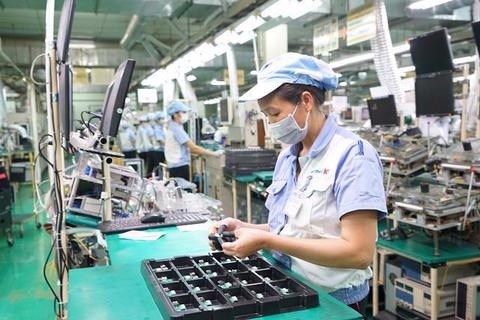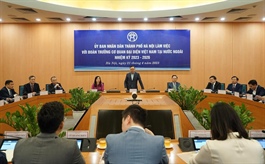Inflation, recovery and digitalisation key areas of focus: OECD
Inflation, recovery and digitalisation key areas of focus: OECD
Viet Nam's top priorities in the coming years include keeping inflation in check, boosting economic recovery, enhancing social protection, improving the business climate and speeding up the country's digital transformation, according to official surveys released yesterday by the Organisation for Economic Co-operation and Development (OECD).

Workers during a shift at an electronics factory in the northern province of Thai Nguyen. — VNA/VNS Photo |
The surveys said Viet Nam has been quick to recover from the downturns caused by the pandemic, owing to an agile policy response. The COVID-19 pandemic interrupted three decades of sustained high economic growth.
"Swift and tailored sanitary measures meant Viet Nam did not experience large-scale outbreaks until mid-2021," said the surveys, "Thereafter, the vaccination campaign was fast. Economic growth outperformed most other Southeast Asian economies through the pandemic, providing a solid basis for further economic progress."
On the other hand, challenges have started to emerge as the South East Asian economy has experienced unexpectedly high inflation due to rising energy and commodity prices, according to OECD.
Monetary policy normalisation in advanced economies has widened the gap in interest rates, further stoking inflation in Viet Nam by adding downward pressure to the exchange rate. This is eroding the purchasing power of households, providing a headwind to the nascent recovery of private consumption and increasing poverty risks for vulnerable households.
The organisation recommended Viet Nam tighten monetary policies to keep inflation in check and provide additional support to businesses and citizens to mitigate the impact of rising costs of living on vulnerable groups.
In addition, the country must lay down some groundwork in anticipation of a higher old-age dependency rate, which has been projected to rise from 11 per cent to 33 per cent by 2050, among some of the highest in Southeast Asia.
Public support and social protection for the elderly, therefore, must be strengthened.
OECD advocated for social security to play a more important role, as well as the development of a comprehensive social security system. The pandemic has exposed a number of shortcomings and limitations as the public pension only covered only one-third of the labour force with patterns of under-coverage strongly associated with employment status.
In order to finance mention-above recommendations, OECD urged the government to seek ways to increase fiscal revenues including fewer deductions and exemptions in the corporate and personal income tax, narrower VAT tax reduction and the implementation of a recurrent tax levied on buildings and non-agricultural land.
Improving the business climate and boosting labour productivity will play key parts in maintaining economic growth in the future, according to OECD.
The surveys indicated between 1990 and 2019, the economy maintained a remarkably high average annual growth of 7 per cent, supported by rapid capital accumulation and ample labour supply from rural areas.
This growth pattern, however, will become more difficult to sustain as the transition from an agrarian to an industrial economy is fully realised and as the labour force grows more slowly. In the future, growth should be driven by advanced technologies and improved economic efficiency.
"To achieve this, it is crucial to restore market dynamism through further simplifying administrative procedures," said the surveys.
While the country has made remarkable progress on digitalisation in comparison to its regional peers with significant uptake of digital tools, and adoption of digital technologies, such as e-commerce, telemedicine and telework accelerated during the pandemic, there is still room for improvement.
OECD called for greater investment in high-quality infrastructure, such as fibre optics, which will help boost uptake and the dissemination of advanced digital technologies. In particular, greater liberalisation in the telecommunications market is crucial to stimulate investment.
Meanwhile, Viet Nam needs to enhance the enabling environment to accelerate digitalisation.
"To further promote digitalisation, more resources should be allocated to the technical and vocational education and training and on-the-job training to nurture digital skills and talents," the surveys said.
These reforms are also crucial to deepen production sophistication which can enhance Viet Nam’s integration into the global economy.

























